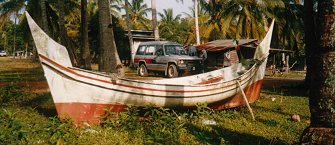Prolog
![]()
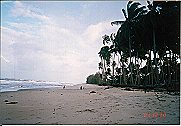 The beach of Mengabang Panjang. Once upon a time, the beach was the land and there were houses and people living on the land. And the land, the houses, and the people were the family of my mother's father. My (maternal) grandfather worked on the land that had changed into a beautiful beach. | 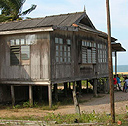 In every enclave, one is prominent. He leads the men around in the fishing trips. He has some extras in the marine world. They depend on him to a certain extent for the life line and other welfare matters. | 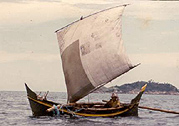 A prominent feature of life in the 1960's of the dwellers of the coastal plains from Seberang Takir to Penarik, Terengganu. They go to the sea like a clerk goes to the office. However, they have the skill no school has the curriculum. They acquired it by experience, from being together with their foreparents. |
When I was big enough to notice that other children had their grandmothers and grandfathers, I asked my mother about my grandmothers and my grandfathers. I asked my mother about her parents and my fatherís parents. It did not take long for me to understand that they all had passed away, long before I was born, even longer, before my mother began to develop a sense of life. But it took me a very long time to picture, to feel partly the taste, to imagine to get into my motherís life, and to be able to infuse the fact that the life was the precursor to my very own life, before she became my mother. When I was about twenty, on a visit to relatives in her birth place, my mother showed to me where her parentís place used to be, since I jokingly put a question of our destiny to her, were there anything my grandparents left for my mother to live on. The place she showed to me was a long sandy white beach, the sea-land Ďtwizoneí of Terengganu and the South China Sea, then became a landing spot for the coastal line fishermen in small two-seater or single-seater rowing boats. Many of the thin tall coconut trees barely bearing fruits grown on the bank were bowing towards the sea, against the direction of the wind, which got very strong indeed during the Monsoon season. These coconut trees, once a source of food stuff, were then no longer bothered by the inhabitants around, demonstrated to me that the place had been there for a very long time, and one by one the trees would continue to fall to the sea together with bits by bits of the once my grandparentsí land. Since then I never asked my mother about her parents, not even their names. I learned that my grandfatherís name was Musa from my motherís identity card, not from my motherís or Pak Longís story. I never knew my grandmotherís name. My mother instead told me once in a while about what she remembered when she was growing up. So did Pak Long, my motherís eldest brother and the only brother who survived the life with my mother, whose real name was Ismail.
My mother did not have a good childhood life. She was an orphan, as far as she could remember, with Pak Long, and another elder brother, Muda, before my mother got married to my father. In fact, marrying my father was a clandestine ticket out of misery, a destiny she was set into, as my mother told me that she could not describe how happy she was during the solemn days of getting married to my father. She even could not remember how her father and mother looked like. She was taken care of by relatives, especially her paternal uncles, and from a distance, by maternal uncles.
Her birth place was the fisherman village of Mengabang Panjang, near Batu Rakit. My Pak Long continued to live there, and Mengabang Panjang was one of my childhood playground, where I was loved by every body there as much as my mother was. My mother's paternal uncles lived in the area of Mengabang Telung, a half day walking from Mengabang Panjang to the south by the beach road. Some of her maternal uncles, however, also fisherman family lived in Hiliran Jejawi, a prefecture in Kuala Terengganu, which in those days was not very much different from Mengabang Telung. Pak Long told me that the day his mother passed away, long after his father had passed away, my mother was still a very small child. Pak Long could not even go for his mother's burial because he has to take care of my mother who did not know anything of what was happening. Every body else went for the burial, but he has to stay at home nursing my mother. My mother thus was a Mak Su to all her relatives, and consequently my father was an Ayah Su.
Pak Long and Muda, being kampung boys seemed to manage themselves with a life without a mother and a father around the village with the villagers, all relatives, close or distant, especially Tok Su Lijah and Tok Ngah Timah, who both were maternal unties, and both were childless. Pak Long lived with Tok Su Lijah in Mengabang Panjang and Muda lived with Tok Ngah Timah, who later moved to Maras; he died a teenager, my mother just had a faint memory of this elder brother of her.
My mother was a very small girl at that time and required a proper family to bring her up. My mother told me, as narrated to her by her uncles later when my mother was big enough to understand it, that there was a tussle to win the guardianship of my mother between her paternal uncles in Mengabang Telung and her maternal uncles in Hiliran Jejawi. Pak Long was a boy of very much ignorant about bringing up his very young sister. There were four maternal uncles living in Hiliran Jejawi, Tok Su Sungai, Pak Dolah, Tok Da Berahim, and Pak Su Ali. It was, in the end, won by the paternal uncles on the ground of birth right. My motherís maternal uncles were more prosperous than the paternal uncles, but apparently that was not the point. The issue was that as a more adorable child of being a girl, my mother was like a princess to every relative, paternal or maternal, and thus after being made an orphan, everybody got the long awaited opportunity to become her guardian. My mother was "snatched" by which ever uncle who managed to persuade her to be with, and the problem was my mother appeared to like to every uncle. I believed my mother was a pretty girl when she was a child, but unfortunately an orphan.
Both Tok Su Sungai, who I had some memory of, helped a lot my family in the painful years, but then they were very old and almost home-ridden. They passed away when I was in early teen led by the male Tok Su first. They were survived by a daughter, Mak Teh Chah, whose family later moved to live in Dungun. My mother kept in touch with her from time to time, and especially my elder brother, to the very end of my motherís life.
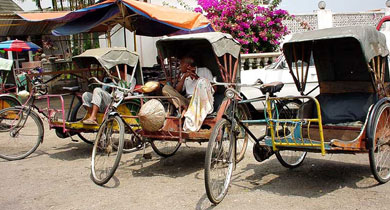 Beca, the ubiquitous town transport in the East Coast, especially Kuala Terengganu and Kota Bharu in the 1960's. They were called "teksi" (taxi) - in the absence of the true motorised taxi as in KL. | 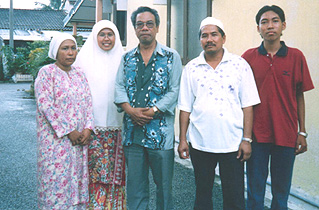 CheNik, my #1daughter Rubaini, me, Shahrani, his son, on a "mission" visit to their home in Ipoh in 2003. |
Pak Dolah, or more familiar as Pak Hiliran, continued to live in Hiliran in a compact family, being slowly compressed by the current of physical development in Kuala Terengganu. He was a fisherman when young, but later became a trishaw rider in the town with a very small income, always up to his nose to feed his seven children. The eldest, Mat Rani was several years younger than myself. Mat Rahim, the fifth was the brightest, but unfortunately ill-fated. He went to a residential school in Sarawak under the state fund, from form one to form five. He met his ill-fated destiny after two years in the Chemical Engineering diploma course at UTM, Kuala Lumpur after his SPM. He became incomprehensible and conceded, returned home to become worse than his other brothers and sisters. The second one, CheNik married to a Perakian workmate while they were working in Pejabat Cetak, KT, then moved to live in Ipoh. Her husband birth place was Kuala Kangsar. Other children all live in KT, on their own feet. Pakís wife, Tok Chik was closer to my mother, than himself. His family and my family had never been further apart than the closest relationship, in whatever life conditions, to these days.
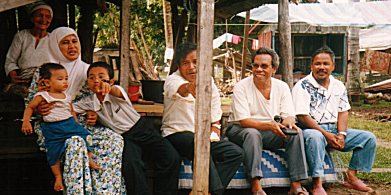 2001, Dec 20. Aziz (on my right) and Ismail on my left, both are sons of Tok Da Berahim. They, and almost all their sisters and niece and nephews, came on this day to Mengabang Panjang, all the way from Tanjung Api, Kuantan. |
Pak Su Ali, the youngest, was of my mother age, lived with Tok Chik in Hiliran. He got married to a local lass and earn a living as a cinema attendance in KT. On a promotion exercise he moved to live in Kota Bharu. I had not been to his place, neither had any of my brothers and sisters. So I had not much information about his family. One time in mid 90ís I was told that he asked to spread words asking all relatives to go to Kota Bharu for his daughterís wedding. I did not go, I was in Bangi then. Tok Chik and her children kept in touch with Pak Su Ali from time to time. He passed away not long after that in Kota Bharu.
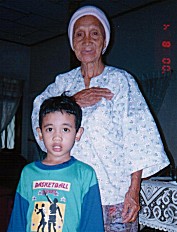 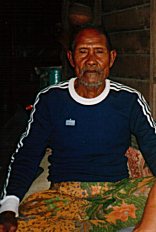 MakLong, perhaps in her 90's in year 2000, with my #7, Ashbi in my home in Bangi. Technically she is my mother's (elder and only) sister in law, practically, she is my mother's mother, sister, and untie, all in one; and Pak Long in Dec 2001 in his home in Mengabang Panjang. |
Pak Long lived in an indigenous life of a fisherman in Mengabang Panjang, all his life to his biological limits. He experienced both the traditional fishing using a two-seater rowing and sailing boats confronting the waves of the South China Sea up to Bidong, and the motorised speed boat era, though still on line fishing. He in fact owned two speed boat engines. Unfortunately in later period, his family matters are also as wavy as the sea he was confronting. He probably felt the rebirth of his youth days, he left Mak Long for a multiple-children-widow from Tanjung Gelam. Both of his children felt their father had betrayed their mother so much, that they kept incommunicado for many years, shunned each other even though they stayed very near each other. When I visited them, obviously I started with Pak Long, I have to for the respect I owed him, but I am not partial. To us the Ďoldí Mak Long was our Mak Long, unchanged as it used to be from as early as I could remember, who then stayed in a small house next to her daughterís house, Melah. She came to my house in Bangi several times, and visited my mother very often when my mother was ill. The Ďnewí Mak Long is just another addition, devoid of closeness due to the late entrance.
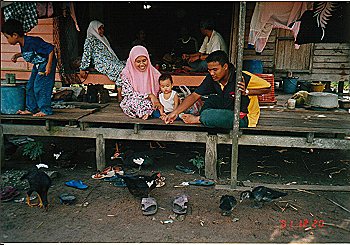 My children enjoying the hospitality of my mother's relatives, the way I had it when I was at their age. |
Melah married to a local lad named Deri, and had many children. She liked going to places under the pretext of visiting relatives, even to the extent of leaving her husband with the children at home. She then became very close to my younger brother, Num who lived in Segambut, KL. It began with her eldest child, a daughter, Ida working in the baby sitting home run by Numís wife in the late 80ís. Melah was very close to my mother, and to my mother she was as close as my sisters. My mother helped her very much when she was in need, and most of the time out of my knowledge. I was told that she visited and nursed my mother often when my mother was ill.
Tok Su Lijah lived in Mengabang Panjang to her last day. She died in the 70ís of a cancer in the tummy. My mother and I had visited her once when she was bed-ridden, XXXXXXX, shortly before the end of her life. Her house was very near to the beach my mother showed to me as my grandfatherís land. Her husband, Wak De, was a fisherman too, like all others in the village. When Tok Su died, Wak De retuned to his birth place, which I believed in Besut or Kelantan.
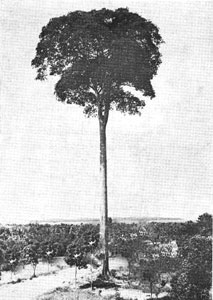 One sepetir tree on the left side along the bus track from Batu Rakit to Merang. This was the land mark; a junction opposite the tree is the path to Mengabang Panjang. My mother remembered the tree to the end of her life: the tree in the middle of those 'savannah' day that marked the path to the land where once upon a time her parent lived, and the place where she was born. Another sepetir tree was an aquaintance of my father. It was in Wakaf Padang; it marked about half way along the road track between Batu Enam and Kubang Badak. 'Travellers' stopped at here to drink from a (very deep) well, and a 'gazebo' (wakaf) for a rest. My father used to wash and pray here in his journey to "Pantai". My brother and I remembered these two sepetir trees: one of my mother and the other of my father. |
Tok Ngah lived in Maras, her husbandís place, a full morning walk to the west of Mengabang Telung passing Wakaf Tengah. I did not remember her husband. During my early life, we were not very close to Tok Ngah. In fact my mother was always reluctant to tell her feeling towards Tok Ngah, especially when she has got to the knowledge that the woman carrying bucket of fruits on her head who passed non-stop in front of her several times a week from Maras to Mengabang Telipot, was actually her untie, her motherís sister. In her later life Tok Ngah was as childless as Tok Su Lijah. And it was during her later life that she frequent herself to visit almost all her brothers and sisters, even up to Kuantan, especially including my family, since then my younger brother and I were able to stand tall behind my mother although my father had long passed away. She was one of the Ďleadingí elders during my wedding night in October 1976. When my mother was bed-ridden in late 80ís she often came to my motherís house, but did not actually Ďvisitedí my mother. After my mother passed away in 1989, she felt she had lost the link. One night, in Ramadan of Feb 1993, while with her younger brother, Tok Da Berahim in Tanjung Api, Kuantan, she had a chest pain. She was sent to Kuantan Hospital by her nephew. It was a severe pain and she was in comma, and immediately referred to Kuala Lumpur General Hospital. My younger brother, staying in Segambut, KL, and I was put as the contactee. After two days in ICU the doctor advised that she be taken home. She was suffering from a kind of liver disease. Mar 20 Sat, 1993 I signed the exit letter and put her in a private ambulance taking her back to Tok Daís place in Kuantan. She passed away the next morning, about eight hours after the oxygen line was disconnected, a few days before Eid 1413. I visited Tok Da the evening after the burial with all my children, incidently on my way home for Raya break. And incidently too, that was the last time I saw Tok Da. He passed away several months later.
So, my mother began her trial of life by living with one of his paternal uncle, we called Tok Ki Soh with his wife Tok Hitam of Gelugor, in the fisherman village of Mengabang Telung, surrounded by cousins and other distant relatives. I had only a very faint memory of Tok Ki Soh, but I remembered well Tok Hitam. Tok Ki Soh was not a full time fisherman, unlike others who lived there. He was a lives stock trader, and that was how he got attracted to Tok Hitam who was not entirely related and lived Ďfarí from his village. He also made copra out of the coconuts which was a typical abundant flora of the coastal area. His house was one of the big houses in the area, painted white, whereas others were made from small bush woods, as far as I could remember. I do not remember any, if any, of Tok Ki Sohís children, my motherís cousin. I did not remember the day Tok Ki Soh died. After Tok Ki Soh died, Tok Hitam lived for a while in Mengabang Telung continuing making copra, but when she was getting older she returned to her birth place, Gelugur, a padi plantation area, about ten kilometers west of Kuala Terengganu, and lived with relatives there, childless. My mother asked me once, on May 1 Tue 1979, many years after my father had passed away, to take her to visit Tok Hitam in Gelugur, not many years before she died there. During my familyís painful years, I did not remember Tok Hitam had ever visited us, so during that visit, while Tok Hitam was rather old, had lost a lot of memories, rather senile, and my mother was well under my care, in fact her health had began to bother her, I saw my mother was actually in destitute of a motherís touch in her upbringing and in bringing up her children. She wanted to show an adult daughterís love to her mother, but it was unreceptive to Tok Hitam. My mother still called her "Mom". I saw how my motherís two eyes met Tok Hitamís two eyes, the only physical love I saw taking place, and the four eyes talked to each other, telling each other and witnessing each other in a language full of tears. I saw the eyes were telling what were missing and what were done and undone in a very regretful exchange of notes. In her late old life, I saw Tok Hitamís eyes was full of regret, and I saw how my mother was helpless and regretted herself for what should but had not happened when she was growing up. I gathered that my mother did not have a happy upbringing while under the guardianship of Tok Ki Soh. Tok Hitam did not even recognise or remember me, whereas I was supposed to be her much loved grandson. I was an alien to her during the visit, I did not talk very much. Nonetheless, I remembered when my mother asked, Tok Hitam told her that she was then lived with a subsistence from the State Welfare Department. When we left, after only about two hours visit, I saw my mother gave to Tok Hitam some money, I did not know and I did not want to know how much. That was the first time my mother visited Tok Hitam after all the years she moved to Gelugur, and my first visit too. That was also the last time I saw Tok Hitam, and apparently my mother too. I was not even aware when Tok Hitam died. I was told by my mother who in turn was told after a while later by my paternal cousin, Umi who incidently married to a clerk who lived not very far from Tok Hitamís place. In fact she was the one who told my mother where exactly Tok Hitam was staying in Gelugur although my mother knew that she had moved to the place many years ago. My mother merely did not have an opportunity, swollen in a painful poverty life, to search for her. I myself did not remember when I last saw Tok Hitam in Mengabang Telung before she returned to Gelugur, and my mother never reminded me to keep close to her even though I was supposed to be her grandson. My father, perhaps did not taste a life with Tok Ki Soh and Tok Hitam, since he took my mother to live with him in Nerus right after he married her. My mother was too happy to be with my father that she forgot for the moment what was a life with her uncle and untie, and perhaps it was not important for my mother to tell my father about her past misery. My father on the other hand, while was very good in maintaining a relative, was instead very bad in searching one. I still wonder to these days, how could my father did not show himself to his children his closeness and attachment to Tok Hitam, his supposedly mother-in-law? Whereas my father was a man who took so much care to a relative, his relative or my motherís relative, and the relatives knew my fatherís great concern.
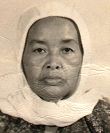 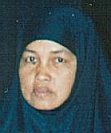    Mak Long Su (left), perhaps in her 70's in middle 80's, and her daughter MakChik Yam in 1991; husband Pok, and Pak Ngah Him. Datuk Ismail Said. |
There was an elder cousin of my mother, Pak Long Kor, whose life was before my memory was installed, and his then new wife, who I called Mak Long Su. She had several children with him and with previous husband, some of them of my mother's age, especially the one I called Mak Chik Yam a slightly younger than my mother. Mak Chik Yamís husband was called Pak, my motherís cousinís son, i.e. my second cousin, who lived in Batu Rakit. I remembered very well their wedding day, I was then six or seven or so. They were my mothers accompaniment when she was growing up, and my mother passed away about five decades later in their accompaniment too. Mak Cik Yam had a younger brother, Pak Ngah Him, a few years older than myself. He went to an English School, SSSS, the school I went for a while in Jan 1964, before I transferred to Sekolah Menengah Padang Midin, a Malay-Medium school in October that year. Pak Ngah Him, turned to become a successful graduate school teacher, married Pakís younger sister, Che Ngah Senim, making it a complex family relationship. They had many children and lived in his birth place, in a big brick house, almost nullified the house in which he was born. Che Ngahís elder brother, Mansor went to SSSS as well and on to University of Malaya. He joined PTD after graduation to become an ADO in Kemaman, but later joined government political party. He had a temporary success in his political carrier, up to a Parliamentary Secretary and was decorated with a Datuk. Then he was made to end at that point in early 90ís. His wife, the Datin happened to be of my age, and in fact in my batch in Sekolah Menengah Padang Midin. She remembered me very well through to form three, as then I was very well known in the school especially among my batch-mate, until I went to SAS in KL, but I did not know her. Pak Ngah Him had a younger sister, Mak Su Mah. She did not have a stable family, but nonetheless finally settled in an oil palm FELDA estate in Kota Gelanggi, Pahang with about half a dozen kids. Mak Long Su had several children from her previous husband, but the one very familiar to my mother was Mak Da Ma, the youngest, but older than my mother and lived not far from her motherís house. Her husband, Pak Da Long, was Pakís elder brother, and thus the three, Pad Da Long, Pak, and Che Da Senim were actually the children of my motherís cousin who lived in Batu Rakit. Thus three of my motherís particular cousinís children got married to three of Mak Long Suís children. Two of Mak Daís elder children, Zali and Rashid, all sons, ironically much younger than myself, did not quite made a living although they both went to the secondary school. I did not quite familiar with their later children although I frequently visited Mak Da Ma, to these days. While Pak Da Long continued to go to the sea, she became a traditional mid-wife.
My mother told me that it was Mak Long Suís family who had brought her up and that she learned to live almost entirely from them although Tok Ki Soh was her guardian. For a long time I thought Mak Long Su was my grandmother because of her closeness to my mother. All Mak Long Suís children were very close to my mother, to my father and to ourselves, to the very end of my motherís and my fatherís life. Mak Long Su, like Mak Long my motherís sister in law, continued to take a great concern on many of my motherís welfare. They were predominantly present during my wedding night in late October 1976, and throughout my sistersí wedding several years later, such important occasions my father had not witnessed during his lifetime, not even my elder brotherís wedding, which was close at the very end of his life.
Even though a district away, Mak Long Su kept a close watch on my mother, and we stayed close at heart with her family. Mak Long Su had never been to my house in Bangi, but Mak Chik Yam and Pak Ngah Him had, in XXXXXX YYYYYYY when they were sending off Mak Long at Kelana Jaya, to Makkah. Not long after the pilgrimage, Mak Long fall ill. Then she lost both of her eye sight. She was bed-ridden for quite some years, many years before my mother passed away. I continued to visit her every time I returned home, taking my wife and my family along. Even though she could not see, she knew very well from a distance that my wife and I were on our way to visit her. I once took her from Mengabang Telung in my car to see my mother in Nerus who was already several years home-ridden. She was not worried very much because then, XXXXXXX, I was an adult standing right behind my mother. That was probably the last time she and my mother saw each other. Mak Long soon began her bed-ridden life, 'seeing' each other only in 'news' carried by those who frequently visited both of them. When my mother passed away in September 1989, Mak Long Su wept on her bed, as she told me later, she could not sleep for three days, tormented by the ending of a life she felt she had a strong bearing during its making. Mak Long Su passed away alone in her home one early morning, XXXXXXX. I was in Bangi. I visited the family on my next return, many months later. Mak Long Su had several brothers and sisters living around the place in Mengabang Telung. My mother knew all of them.
Mak Cik Yam took over her motherís role long before she was ill. Mak Long Su stayed with Mak Chik Yam even though Pak Ngah Him is very much more prosperous. A character like Pak, Mak Chik Yamís husband, and a character like Che Ngah Senim, Pak Ngah Himís wife and also Pakís younger sister, only fate would change the ongoing life. Mak Chik Yam had only three children, the first two was sons, Zul and Din and the third was a daughter, Suzi. Although she or her husband did not go to school, they were rather successful in making a living, physically with a very big house, non-brick though, since Pak was a carpenter during his later years. In his young days, Pak went to Kuala Dungun to work on anchored cargo ships, mostly of iron ore mined in Bukit Besi, an interior of Dungun. He was a successful labourer, but had to return to Mengabang Telung when the iron mine was closed in the mid 70ís. They stayed very close to her mother, Mak Long Su, to her last day. Pakís house was my familyís station, continued from Mak Longís time, every time we made a routine visit to relatives in Mengabang Telung, those days when we had to go overnights, or these days with less than twenty minutes drive from my parentís place. BLAAAAAAAAAAAAAAAAAAAAAA
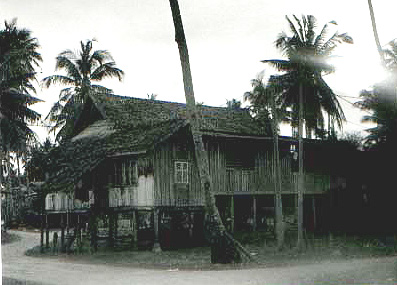 A home in Terengganu, not too close to the beach; not well maintained, but rather have relative to many others. Many boys and girls of the 60's made their lives from many homes like this in Terengganu; |
Growing up with my mother were her causins, the one of my mother age I called Mak Su Saadiah, who lived in Pengkalan Maras to the south of Mengabang Telung, a younger sister of Pak Long Kor. Her husband was Pak Su Awang, a big guy. Mak Su Saadiah was about my motherís age, and was a very beautiful girl in her youth days. She also lived with Tok Ki Soh in her early life. She was an orphan just like my mother. Mak Su and my mother had many things in their childhood life that only both of them shared together. She got married earlier than my mother, and thus had children slightly older than ourselves. Her eldest child is a girl, Maimum, followed by another girl, Yaumi, and then a boy, Wadi. Pak Su Awang passed away a long time ago, when I was still a boy. I remember the house he left when I was small, the very same house Mak Su is staying now. Her daughters, after getting married, stayed very near their mothers house. I did not remember their wedding day. So Mak Su had a very secured surrounding. Yaumi died of a mysterious illness in her thirties, survived by a daughter who then lived with her aunt Maimun. Yaumiís husband was a son of my Ďnewí Mak Long who then moved to stay in Mengabang Panjang with his mother, brothers and sisters, and my Pak Long, his step father.
And another close cousin was Mak Ngah Mandak and her husband Pak Ngah Mat Min. They stayed not very far from Mak Long Suís place. She, sort of much better than Mak Long, with bigger house, a lot of gold ornaments that she wore all the time, including her teeth. Her voice was a non-mistaken indication that she was suffering from a long time asthma, and in fact she passed a away due the illness inflicted by the asthmatic attack, not very long after Pak Ngah passed away. I did not quite recall when, possibly when I was a teenager when my mother told me so, I was not at home then. Staying near Mak Ngah Mandak was another cousin of my mother, Mak Da Yam. She had a son, Muda and a daughter I could not remember the name, because she was very small then.
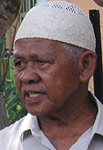 Abang Mat Mak Ngah Mandak; |
Mak Ngah Mandak had a son, I called Abang Mat, slightly younger than my mother. Abang Matís wife was called Abang Mek. Abang Matís eldest child was a son, named Mohd Sah, a few years younger than myself. Abang Mek had a younger brother, I called Abang Zak, a few years older than myself. He got married to a grand-daughter of Mak Long Su, named Dawiah, a daughter of Pak Da Deraman, an elder brother of Mak Da Ma, and a step brother of Mak Chik Yam.
Mak Ngah Mandak had another son, a younger one, Ismail, slightly older than myself. Of all the persons in Mengabang Telung he chose to marry Mak Da Yam, who was much older than himself, and who was then a widow. I was not very close with him. In later years, long after his father and mother died, he divorced her to marry a much younger girl, whom I do not know at all. Although I then befriended Mak Da Yamís son, Muda, who was about my age, I do not know where he is, and I even do not know how Mak Da was doing.
There were some more cousins of my mother, most of them as much as I could recall were females, who lived in Batu Rakit, about six kilometers along the beach to the north of Mengabang Telung. I remembered most Mak Long Setawa who lived very closed to the south of the bus station. From her house I could see the sea and heard the rhythm of the sea wave pounding the beach. When we arrived by bus from Nerus, we normally put up a night or so at her house before moving on to Mengabang Telung the next day or so. We began to infrequent the visit when it was easier to come direct by ĎThe Forestí. Then the disappearance became natural when I began my hostel life beginning in 1964. I virtually left Batu Rakit. But the fate took me back to Batu Rakit beginning in the late 70ís after I got married, however to the north side of the bus station, visiting my wifeís maternal relatives. I did not make any effort at all to relocate Mak Long Setawa, perhaps because of the too distant time lapsed. She died in the mid 90ís of old age. I had not seen her for a very long time that I could not remember how she looked like.
The other cousin my mother used to tell me living in Batu Rakit was Pak's mother, I called Mak Chik, but I was not very familiar with her. So did my mother, at least not as close as the cousinís sons, Pak and Pak Da Long. Her house was further up into the 'interior', quite a distance from the beach. I do not remember going to her house when I was small.
There was one lady living in the vicinity of Batu Rakit who I met only when I was a father, whereas she is my Muhrim, by natural-law thus closer than even to my motherís cousins we were visiting. My mother took me to visit her once in her home, but at that time it did not quite pull my mind the meaning and the soul in all the figures. Mak Teh Pah, my fatherís youngest sister asked me to invite her during the wedding feast which I gave to my sister, Ani on Feb 7 Mon 1994. I did what Mak Teh asked me to do, but I did not go myself, instead Mak Teh took all the troubles to go by herself all along to persuade her to come to the wedding feast. And she came, with her husband, a smart looking man dressed like a school teacher pensioner. On that day, I took her hand and I kissed her hand. Her name was Selma, exactly the same as my motherís name. She, possibly in her sixties then and still strong, was my fatherís first wife. I did not talk very much with her, and I did not have a situation which require me to address her as "Mom", or "Untie", or something, and in fact I did not know how to address her. No one told me until the occasion that my fatherís first wife was still alive and lived in a place within my frequently reached loci. I did not realise the significant of the incident. Many years later, when my sister, Ani to whom the feast was held for, had become a mother of two children I began to ask questions the answers of which revealed indications that my father, Selma, and Mak Teh Pah had a sad anecdote, a sorrow which only three of them could recall, not even my own mother. I had the feeling also that my mother did not have the whole story of my father before getting married to him, perhaps because my mother was too young and ignorant then, and she continued to ignore and failed to understand my fatherís plight. Possibly, after getting married to my father, my mother failed to infuse my fatherís life down from his young days. Knowing my motherís limits, my father kept sharing his sorrow with his sister, Mak Teh, who had been together with him from the beginning Selma was arranged to be married to my father, rather than with my mother who only knew my father after the sad episode. Perhaps too that was the way how Mak Teh could recover from her Ďancientí sorrow which she shared with my fatherís sorrow, by showing to Selma that my father had sons like me and my brothers, and it was my fatherís blessing in disguise, not Selmaís. I knew after a long observation that, my father and Mak Teh had not only shared the same blood, but something else only two of them could tell, to no one but themselves. I noticed that sometimes, especially in his later life, my father went down to Mak Teh for consolation much deeper than to my mother, and Mak Teh well understood it. I noticed Mak Teh's deep sympathy to my father. Neither Mak Teh nor myself talked about Selma after the occasion. Since then, I think I understood my father completely, and I wanted, if I had another chance, to meet and to talk to Selma again on whatever matter, no matter whatever had gone wrong between her and my father. After all, as I was told, she gave birth to my half-brother even though I had not seen and I did not even know his name because he passed away in his teenage while I was an infant perhaps.
My mother was not my fatherís first wife. My father had two failed previous marriages before he settled down with my mother. The first two marriages, as prevalent in those days, were arranged marriages. So did my fatherís third, to my mother. My fatherís first marriage was initially blessed with a son, but he passed away, a teener, some times after his mother left my father. The second marriage was practically a ceremony only, it lasted only a few days, according to my mother. It was solemnized out of the brideís mother fondness to my fatherís high honesty reputation, not the kind of asset sought after by the bride herself. This fact is by no means a minus for my father, since I found out, when I grew up, to my last moment with him, that my father was a unique person. I had never heard of my mother saying anything at all, or uttering words implicating even to the faintest indication that she ever regreted marrying my father, not even in times when my mother had lost all her minds and acquired all her anger. He was sort of "divorced", according to my mother, by his two wives before he was met with my mother. I had not met a man in my life so extremely patience as my father that I had never heard he got angry to anybody, not even to my mother; a man I had not met so extremely honest that he had no one in his life that he did not trust; a man of so caring that nobody in his life dare to hurt him. I was told by my uncles that my father enjoyed the trust of his father, that whatever he did or said to his brothers and sisters, elder or younger, no one would dare to disobey, as though it was their fatherís saying. He was made to exercise this trust since his father, my grandfather, was an Imam, who unlike other Imams, made a lot of mission travelling, far a way from home over long periods of time. Towards the end of my father's life, for about fifteen years, my father left solely to my mother for his children upbringing, I gathered that my mother felt so confidently that it was her pleasure to be destined to be my fatherís wife, and it was a blessing in disguise for what had happened to my father, it was the natureís way to make my father waited for her to grow up to become his wife. It was a very hard life for my father during his last period of life and it was a very painful experience to my mother to start learning to stand on her own with the children, none yet an adult, during that period. I believed that my father was in a deep sorrow indeed that he had to leave my mother and his children to the destiny at the end of his life. I knew my father knew his last days. He was very happy to go, but very sad to leave.
I missed all my maternal and paternal grandfathers and grandmothers during my growing years, I did not know whether any of them was alive when I was born, so my blood was destitute of any grannyís love. But I had a lot more substituted grannyís love. And I found many tracks of my paternal grandfather in the vicinity of my home and my kampung, from my relatives, so abundance around my home, close, intermediate and distant relatives, from the stories narrated to me by other persons, from other elders, that my grandfather was a respectable elder during his time. My father took a great care, within his quiet nature, and concerned so much to all his relatives, close or distant. He made every effort to make sure that his children did not miss or even devoid of their maternal relatives closeness, by taking them to visit from time to time, periodically, and even sent away the children to my mothers relatives, if he was busy, over a period of time, so that we could enjoy ourselves with our maternal relatives. My motherís relatives were so close to my father, that until I grew up, I knew that my father was not related at all with my mother, unlike many other children whose father and mother were at least, those days, distantly related. My motherís relatives warmness to my father was even warmer than that of my fatherís own brothers and sisters. When I was a preteener, I had not felt so at home than when I was among my motherís relatives, even more at home than around my own home. I felt like my mother was a princess to her relatives, and she was everyoneís daughter, and my father was the prince destinely descended to win my mother, and we were the children of everyoneís princess. I felt that when my father took us to my motherís relatives, there was no better time for them to feel being blessed and deliriously happy, the time every one would be waiting for, many times a year, and year after year. When we were around, it was like a festival time. Those days transport were not easily available, and transporting a family was like moving to another place, and yet up to my adulthood, I had not missed any of my elder relatives, maternal or paternal, that I used to get love, frolics, company, guides, pleasure, enjoyment from, all the way from as distant as I could remember when I was growing up. It was because of my fatherís determination in fulfilling his duty as a father.
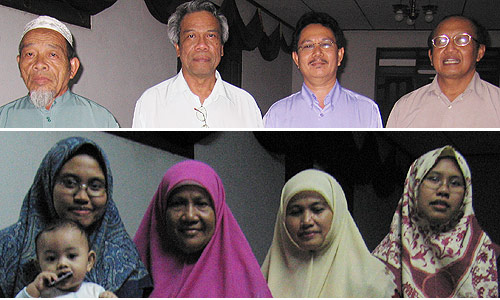 Updated: 2006 Nov 7 Tue. PakTeh Zak (top left), one of my father's maternal cousins, in his 70+ paying us a visit at my home in Sg Merab. He is the youngest son (and the youngest) of my father's maternal untie, TokNgah, who stayed in Pak Madah, Bukit Payong. PakTeh Zak made his life as a settler in Bukit Bading. His wife, (bottom, 2nd from left), from Sg Rengas, is the elder sister of Razak Mohamad (top, 2nd from right), my batch mate in Padang Midin since 1964, then in SAS from 1969, and a colleague onwards in UKM. (Top right), PakTeh Zak's son in law who stayed in Bangi. |
By record, my father, Zakaria, was born in 1914. His father, Ahmad, was a very respectable person in the kampung. I did not know any brother or sister of my grandfather, but my father had many paternal causins in the area. So, my grandfather was probably among the younger brothers in his family. My fatherís mother was known as Mek Teh. I did not have a memory of her, it was told to me that she was so-called by the name because of her whiter skin. She had one and only sister, conversely known as Mek Tam because of her darker skin. My father thus had one and only maternal untie, we called her Tok Ngah. She lived in Pak Madah, in her husbandís place, a kampung full of local fruit orchards, off Bukit Payong, about ten kilometers from Kuala Terengganu to Kuala Berang. All my fatherís maternal cousins were staying around the area. Tok Ngah, or more accurately identified as Tok Ngah Pak Madah, made very frequent visits to her nephews and nieces in Nerus, I remembered it very well, until they were made home-ridden and passed away, first with the female Tok Ngah. In fact the male Tok Ngah did not stop visiting us even long after the female Tok Ngah had passed away. My father rarely visited them, but I knew from their visit to my family, that they liked my father very much.
One of my fatherís motherís grandfather, I did not know by which line, was called Haji Said. He was a converted Chinese, and very pious. He had two wives. The first wife born my fatherís lineage. The other wife, the younger one born another lineage mostly living on the western side of the Nerus river, from Teluk Pasu, through to Tanjung Bunut, Paya Datu up to Tanjung Sabtu. My fatherís lineage mostly lived in villages on the eastern side of the river. Haji Said was a businessman, trading whatever he could, especially textiles, using Nerus river as his travelling route to Kuala Terengganu and Kuala Berang in boat. A relative on the western lineage, living in Tok Jiring, known as Tok Teh Teluk Pasu, because she came from Teluk Pasu before settling down in Tok Jiring, a grandmother with respect to me, was a childless first wife. She adopted one of my sisters, Adik Ma, in the 70ís, during my fatherís and my motherís hardest pain in their life. The youngest of the Haji Saidís grandsons was called Ustaz Ayah Teh, i.e. my fatherís second cousin, aged very much younger than my father, stayed in Paya Datu. He helped my mother a lot after my father had passed away. Another relative from the same kampung from the same lineage, known as Ayah Da Man, who I did not know exactly the hierarchial relationship with me, but not further than father-son, and his paternal cousin-wife, Che Da Seni, then living in his wifeís place, Kampung Kubur, Batu Rakit, gave birth to a daughter on Sunday, April 24, 1955, their first child, with the name Aíesah, who was later renamed as Azizah. In the mid 1976, my mother asked the girlís hand, then twenty one, whose family had moved back to Paya Datu, and was just finishing her STP schooling. She agreed, and her parents consented. I married this girls, in a small wedding ceremony on Thursday night October 21, that year.
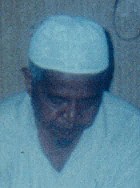 Abang Mat Pahang, my eldest paternal cousin; he started his life in my father's home, and made it up to the end in Kuala Sentul, Maran, Pahang. |
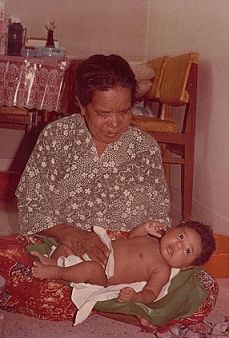 Mak Ngah, my father's elder sister, in October 1978, perhaps in her late 70, nursing my #1, Rubaini, in Damansara. |
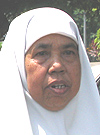 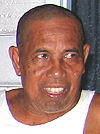 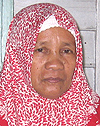 Mek Lah, the elder sibling of Mak Ngah; and the younger Abang Zak and Abg Wok; I was very close to the Abg Wok's younger brother, Yusof. We played kite together in the 'Alor', and I always kept my kite at his house, because it was near the 'Alor'. One late evening on finishing my 'kiting' session at her home, I heard she was weeping, with her mother sort of conforting. Not long after that she was married to Abang Zak. They initially stayed at the 'Alor'. One night Abang Zak took me to a fishing trip (tahan tauk) at the padi field in Pagar Keh; on a routine probing the taut at the very mid-night, we heard a sound of strong water splashing, distinctly not of a haruan snapping the bait. I was very scared indeed, but Abang Zak kept very cool. We ended up there and then. It was not a good catch. That was the first and the last time I went out 'tauting' with Abang Zak, who throughout all his young days was very close to flora and fauna of the padi field. |
Ayah Chik (his real name was Yusof) was a carpenter; firstly married to a distant relative around Pengkalan Arang, but was strongly disconsented by his father. I was told by my uncles and unties that he was not even allowed to come home with his wife. He was blessed with a son, Alias, but whose parents were unfortunately not. He stayed with his maternal grandparents whose home was adjacent to my father's home, and thus, in the young days I remembered, Alias was very close to my mother. His own stormy life, eventually calmed and settled down in adult life in Batu Tiong, Dungun. Ayah Chik remarried in Ulu Takir, settled down with a blessing of big family, inherited his father's career of Imamship, learned and studied under the tutorship of a notable Ustaz in Seberang Takir, Utz Yong, whose sixth son in 2002 destined to become my son in law. Ayah Chik's new family's first son, Ramli had an early adventurous life too, and ended up marrying an army cook's daughter who was staying in Sentul's camp. They visited me in Jun 27 1970 in SAS, and took me for a night in his place for that weekend. They were the only visitor I had during my four years tenure in SAS from Jan 1967 to Nov 1970. Ramli was blessed with unbelievable seventeen (17) children. The fifth sibling of AyahChik, a boy, Ahmad Yusof, was of my age. We were together in Padang Midin School in 1965 and 1966 (and unknowingly in SS in 1964), before I left for SAS, KL in early 1967. He had a trait to inherit his father, but unfortunately after several years of study in Indonesia, he passed away in a mysterious accident in 1983 Dec; he failed to win an ADUN seat of Seberang Takir in 1978 GE. Ayah Chik passed away in my absence (in England), and in the absence of his most loved son Ahmad's, in 1975 Sep 17, three years after my father. I last saw AyahChik in Sep 1974 in his home during my short break just before I left for my study leave in England. In Mar 1973 before that he accompanied his friends' Haj journey up to KL (Merdeka Hotel, Chow Kit, Mar 4 Sun) where I met him and with his son Ahmad who was on leave from Gajah Mada, Yokyakarta (perhaps this was the last of their seeing each other).
Mak Chik Khatijah, Ayah Endut, Mak Da Memun, Mak Teh Pah and Ayah Li were my fatherís younger brothers and sisters, nearly in that order. Ayah Li was surely the youngest. Like MakLong, I had no memory of Mak Chik Khatijah. I was told that she had been married to a local Imam named Pak Chang whose wife had passed away and born a son named Ibrahim Azmi. Mak Chik Khatijah passed away not long after that without bearing any children. I had a very clear picture and memory of Pak Chang, then was the Imam of the mosque I was growing around, who later married to Mak Teh and had many children; one of them is Deroman of my age and my folk-mate until I disappeared to KL. Mak Teh became a close neighbour to my family for a long time since she is a distant relative of my father. Ibrahim went to religious school and continued up to Mekah and Madinah. He returned home many tens of years later, unfortunately to become a politician, and more an unsuccessful one. All Ibrahim's half brothers and sisters did not make their lives through schooling, religious or otherwise and especially so after the passing of their father.
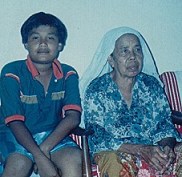 Mak Da Memon, my father's younger sister, with my #4, Muzani, in Sg Merab in 1996; |
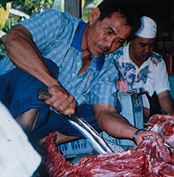 Ayah Endut's eldest, Muhamad. At this age, fifty plus in 2004, about my age, he is very much of his father; |
Mak Da Memun got married in Tok Gembang, only a walking distance from Pengkalan Arang, and lived there. Unfortunately she was childless. Her adopted son, Nawi is a year younger than me, and was together with cousin Ahmad in Padang Midin in 1965 and 1966, and joined the army after many years trying unsuccessfully to make a local life, but retired after a short sevice to became an ordinary kampung citizen; and an adopted daughter who was many years younger. Perhaps drowned in childlessness, Mak Da is a distance away from Mak Ngah. Mak Da passed away on Tue night 2004, May 11, on the land she was born, and buried on the same grave as my father.
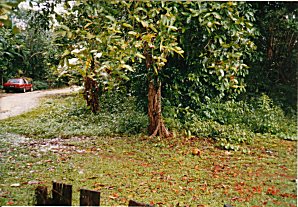 2001, Dec, this jambu air tree (jambu penawar), and its parents and grand parents had witnessed a lot of changes on the soil where it is growing. The tree was grown by my father from a seed on the parent tree grown a bit further to the background which then died and rotted. There was a wooden bench under this tree. My father spent most of his days on the bench during his later years of life, weaving rotan ring used to extract coconut milk from its grates. There was a big dedap tree (flame of the forest) a few meters away, it never stopped producing the red flowers as far as I remembered. Under this tree was my vegetable plot when I was past-ten years, I grew timun (cucumber), terong (eggplant), peria, petola, and kacang (long bean); it was not a well maintained bed, the sun-lights and the fertilizer were not quite right, but we harvested some of them for our feed. On the soil where the jambu air grew, was MakTeh's hut when she firstly married to PakTeh Mat, before they moved to Batu Enam. On this soil was the home of my father's father. When he passed away, this part was inherited by Ayah Chik. Now it is owned by Halim, Ayoh Chik's sixth sibling who had a home somewhere else. The part next to it (from which this photo was shot), was inherited by Mak Ngah who had to moved to stay with her husband in Banggol Donas. She made up her mind and sold it to my father on the condition that my father made his home there so that their father's home could be continuosly cherished. My father built the home, continued his father's life, bringing up his younger sister and brother, and built his own family. I was born on this part of the land. |
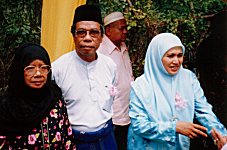 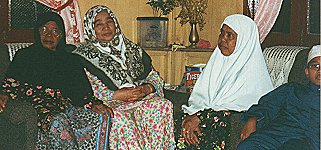 (Left) Mak Teh (on my right) was right with me on my important day, just like my mother would, and she came down all the way from Terengganu for it. (Right picture, from left) Two Mak Teh's: one my father's sister (extreme left), and the other from the second wife (Teluk Pasu) lineage of my grandfather's grandfather (Hj Said); she stayed in Paya Datu. On this occasion, the distant Mak Teh was visiting the closer Mak Teh who was coming for my occasion; Mak Ngah's daughter, Mek Lah, and my #7, CB. |
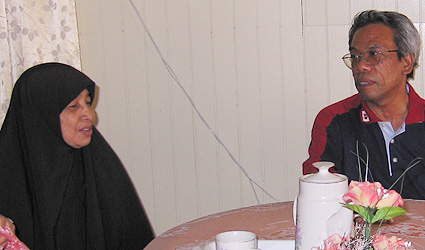 Maksu, my father's youngest brother's wife; 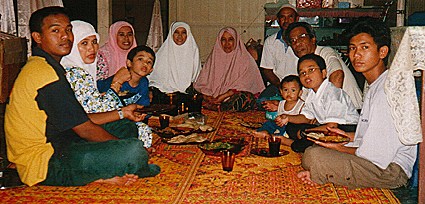 2001,Dec, Mek Lah, Ayah Li's eldest (daughter) family in Tok Jiring (the three in the back row). My family members lining the side rows. |
I was told that my paternal grandfather was a very trusted respectable person in around Pengkalan Arang. I came to notice the trust and respectability from the emerging fact that whenever a multiple-owner land was to be transacted at the land office, the sole name of my grandfather appeared, then transfered to my father, including the land belonging to persons I knew were 'rich people' around the mosque of PA. I observed also the homes of my grandfather's sons and daughters; I inferred that he must have given 'advice' to them that whenever they wanted to build the home, build it near a praying place, a mosque, or if none, lead a 'team' to build one, a surau, and then lead to cherish it.
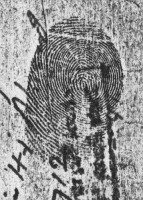 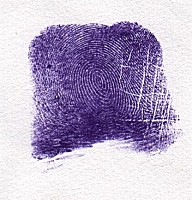 The only trace of my father that I could preserve: his right thumb finger print on my BC (left). I inherited the 'plain whorl' pattern on my right ring finger (jari manis) (right). The rest of my fingers have 'loop' type prints. |
Edition dated: Mac 2003
